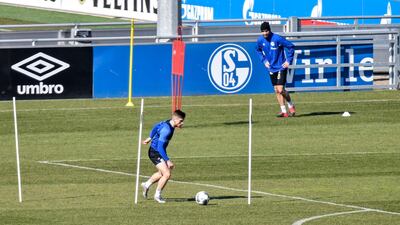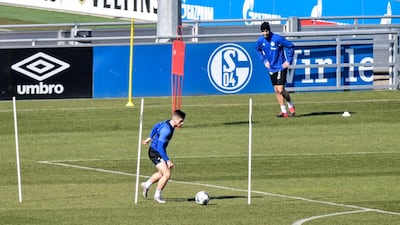Germany’s leading clubs will on Tuesday submit to the government in Berlin the results of a comprehensive set of Covid-19 tests on their players and hope they provide some the evidence needed to allow the Bundesliga to restart.
With strong backing from regional health authorities for a go-ahead, albeit with all games played behind closed doors, German football, suspended in mid-March, knows the world be watching - and that leagues across the world are hoping to be able to learn from, and copy, any safe formula for matches to take place.
Players in the top two divisions in Germany, where the coronavirus crisis has been contained far more effectively than in most western European nations, have been in training since early April, subject to strict protocols limiting contact and the numbers involved in each session.
Yet, while the momentum towards a restart for the Bundesliga suffered a setback at the weekend when two players from top-flight Cologne tested positive for Covid-19, there is determination that football can resume with a minimum of risk to participants and to public health.
Cologne have isolated the two players, named in the German media as striker Ismail Jakobs and midfielder Niklas Hauptmann as well as a club physiotherapist who had also tested positive - all three are reported to be asymptomatic - but other squad members, who have tested negative for the virus, trained together on Monday.
Several other Bundesliga clubs reported that tests carried out on their squad and key personnel ahead of the weekend had produced no positive readings.
Cologne defended the decision not to quarantine all the staff who had been on site with the three infected individuals, citing guidance from the regional health authority, which says quarantine becomes necessary only once someone has had close contact with an infected person for 15 minutes. The protocols governing training sessions over the last month have prevented such sustained contact.
“The understanding of the virus has developed over the last seven weeks,” said one German public health official, “so while it was the case in March that everybody exposed to anyone testing positive Covid-19 would be quarantined, that no longer applies.”
German clubs privately acknowledge that an automatic two-week quarantine of all teammates in case of a positive test within a squad would make the restart of the Bundesliga, where the top-flight clubs each have nine matches left to play, all but impossible.
But, citing the advice of public health bodies that full quarantine is necessary only under sustained exposure to infection, they will press central government in Berlin to give its blessing on Wednesday to the resumption of fixtures from as early as May 16th.
This week, Germany’s lockdown eased significantly, with schools in several regions reopening to students in selected year-groups, but there is anxiety that professional football’s return to stadiums and to television screens should not run any risk of increasing possible contagion or be seen as a primarily commercial impulse.
As in major leagues elsewhere, the Bundesliga clubs stand to suffer heavy losses in terms of broadcast revenue if the 2019-20 season is not completed.
There is concern among players, too. After the three Cologne employees tested positive, the club's Belgian midfielder Birger Verstraete, told the Belgian newspaper Het Laatste Nieuws it seemed "bizarre" the whole squad had not been quarantined, adding that he had a particular concern that his partner, who has a heart condition, might be vulnerable if he was exposed to an infected person, and then passed it on to her.
Verstraete later acknowledged that his partner was not in Cologne with him, but in Belgium, and that he had given the interview “feeling emotional.” He said he had since had some of his “questions answered.”
Horst Heldt, the general manager of Cologne, meanwhile sought to reassure players that rigorous testing will enable all clubs to prepare for a possible restart to the season with the risk of contagion minimised.
“Once we go into full team training,” explained Heldt, “there will be physical contact, and according to the league’s medical advice, that can only be allowed once everybody on site has tested negative for the virus. Once that has happened, we have to make sure our staff cannot be infected outside the club, and the best way to do that will be to have everyone together in the equivalent of a training camp.”
So, should the Bundesliga resume, it will have the character of a summer tournament, with teams corralled in hotels.
Should it resume successfully, it would set a template for the Premier League, La Liga and Serie A to follow. A majority of leading clubs in England, Spain and Italy are pushing to complete their 2019-20 seasons but if they do restart, it will be under conditions distinct from Germany's.
More than 25,000 lives have been lost to Covid-19 in each of Britain, Spain and Italy. Germany, the most populous country in western Europe, has reported less than 7,000 deaths from the virus so far.






